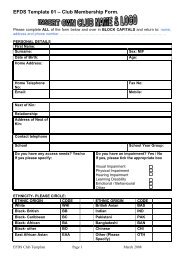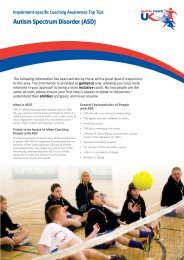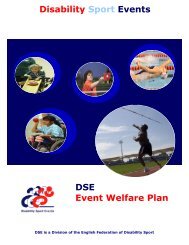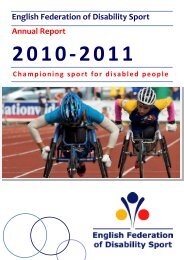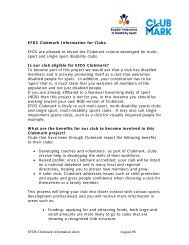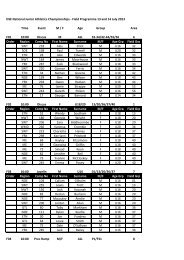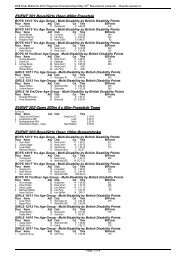OO213 - English Federation of Disability Sport
OO213 - English Federation of Disability Sport
OO213 - English Federation of Disability Sport
- No tags were found...
Create successful ePaper yourself
Turn your PDF publications into a flip-book with our unique Google optimized e-Paper software.
An inclusive kindergarten in Nizhny Novgorod, Russian <strong>Federation</strong>. © UNICEF/RUSS/2011/Kochinevadisabilities have equal access to rehabilitationand other services and opportunities – health,education, livelihoods. Developed by the WorldHealth Organization (WHO) in the late 1970s andearly 1980s, it is practised in more than 90 countriesand represents a move away from the concentration<strong>of</strong> care in institutions and at the hands<strong>of</strong> specialists towards community self-reliance,collaboration and ownership in addressing theparticular needs <strong>of</strong> people with disabilities –critically, with their own active participation. 24CBR can prove effective in addressing multipledeprivations. Children with disabilities who livein rural and indigenous communities contendwith multiple disadvantages: They have disabilities,they belong to a marginalized groupand they live in remote locations. They havelittle or no access to services that could ensuretheir development, protection and participationin community life. 25 An outreach initiative ledby the Centre for Research and Post-SecondaryStudies in Social Anthropology (CIESAS) inOaxaca, Mexico, provides an example <strong>of</strong> CBRfor indigenous children with disabilities, theirfamilies and community. In collaboration withUNICEF and with financing from the state welfareagency DIF-Oaxaca, CIESAS used CBR to advancethe inclusion <strong>of</strong> children with disabilities in fourremote rural communities 26 with large indigenouspopulations and low Human Development Indexscores. Teams – made up <strong>of</strong> a doctor, a physicalor occupational therapist, an educator and twocommunity activists fluent in local indigenouslanguages – were trained and sent into the communitiesto conduct workshops on discrimination,inclusion and children’s rights. They promotedthe formation <strong>of</strong> local support networksamong the families <strong>of</strong> children with disabilitiesand, where appropriate, provided referrals to medicaltreatment or therapy. During the three-yearperiod 2007–2010, the initiative led to increasedFUNDAMENTALS OF INCLUSION17



